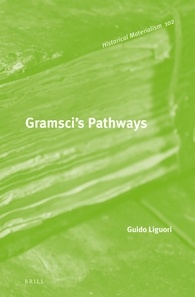Guido Liguori, International Gramsci Society Italia
Gramsci’s works, in particular his Prison Notebooks, are a real ‘workshop’ of activity. Even though these texts were the product of a great mind and an organic conception of the world, the particular context in which they are written poses challenges for their interpreters. This philological ‘excavation’ of the pathways of Gramsci’s thinking brings us closer to an author who is more ‘widely-known’ than he is understood. The first part of the volume deals with central themes of Gramsci’s worldview such as the concepts of the state, civil society, ideology, common sense, morality and conformism. The second part deals with Gramsci’s relations with thinkers as diverse as Machiavelli, Marx, Engels, Labriola, Togliatti, whereas the third part offers some reflections on the metaphors used by Gramsci as well as contemporary views of the Sardinian Communist.
First published in Italian by Carocci Editore as Sentieri gramsciani, 2006.
Biographical note
Guido Liguori is the president of the International Gramsci Society Italia. Having written numerous works on twentieth-century political thought and in particular Italian Marxism, he is author of Gramsci conteso (Editori Riuniti, 2012) and joint editor, together with Pasquale Voza, of the Dizionario gramsciano 1926-1937 (Carocci, 2009).
Readership
All interested in the thought of Antonio Gramsci and the history of twentieth-century political thought.
Table of contents
1. The Extended State
2. Civil Society
3. State, Nation, Mundialisation
4. Party and Movements
5. Ideologies and Conceptions of the World
6. Good Sense and Common Sense
7. Marx and Morality
8. Marx. From the Manifesto to the Notebooks
9. Engels’s Presence in the Prison Notebooks
10. Labriola: The Role of Ideology
11. Togliatti, the Interpreter and ‘Translator’
12. Hegemony and its Interpreters
13. Dewey, Gramsci and Cornel West
14. The Modern Prince
References
Index

